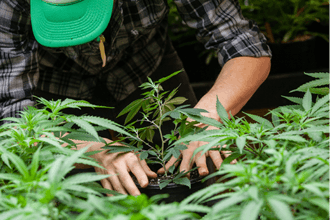

Are your employees worried about their job security with a lot of uncertainty? Probably.
Should you, their employer, be concerned about employees who are anxious about their future? Definitely.
The media, both traditional and social, talk to your employees every day. Your employees hear about the amazing growth of the cannabis industry, expected to be many billions of dollars by 2020. The people who work for you also see increased retail outlets in their neighborhoods; they don’t need to be told that demand for marijuana products is growing. Their friends tell them about new job opportunities, especially for experienced workers. They also hear questions about the new federal administration’s stance on legalized marijuana, and they talk to their fellow employees and their friends about what could happen if the feds take a hard stand against the industry. And then it becomes personal: What is going to happen to me? To my job?
Do you know if your employees are anxious about their future? Do they understand your company mission and feel they are a part of it? Do they feel appreciated for the work they do?
Happy employees are more likely to stay with your company. They also tend to be more engaged and more productive. When employees leave for better job opportunities, it is easy to assume they left for bigger paychecks. But recent research tells us that most employees go to companies that offer non-tangible benefits such as interesting work, an inclusive culture, personal autonomy and career opportunities. Especially important to Millennials (likely to be the majority of your employees) is the idea of work-life balance, and a supportive and appreciative work environment.
What are some of the issues your employees are grappling with when they come to work each day?

- The new administration and the federal role in the cannabis industry has produced increased uncertainty; employees see that new cabinet picks have been largely anti-marijuana.
- Millennials are the new workforce (born between 1980 and 1996), and they are more likely than previous generations to switch jobs.
- Marijuana market growth continues to drive demand.
- Evolving state regulations and requirements require continuous flexibility and adjustment to rapid change.
- The uncertainty at the federal level has caused some companies to change or reduce their growth plans or put them on hold, which employees can view as career-limiting or cause for job shifts.
- More states are allowing recreational use of marijuana products, which impacts the size and rate of harvests.
- The industry is expanding to include more large producers, increasing strain on existing talent resources, as well as requiring more management and administration skills.
- Grow operations utilize sophisticated science and technology, which require a skilled workforce; the skills companies will need now and into the future are likely to require equal emphasis on hard technical skills as well as traditional by-hand trade skills.
How Does This Potpourri of Information Impact Your Employees?
While the uncertainty around the future of the cannabis industry affects people in a variety of ways, it has been proven that increased stress can result in sick employees, which in turn can result in increased sick time (off the job). Twenty-four percent of workers surveyed by CareerBuilder in 2016 said they’d called in sick in the past year because they just needed to relax.
Chronic stress associated with uncertainty lowers performance. Chronic stress also is a key factor in “burnout,” a phrase made popular in the 1980s, to describe an exhausted, depressed, listless state that not only affects the worker, but also family and co-workers.
When people are thinking about non-work issues, they are usually less productive, and exhibit less focus on the job. And in your cultivation business, focus is important, and attention to detail is critical.
Not every employee is able to adapt quickly to change, or to be flexible in an evolving environment. When people feel they have more change in their work life than they can effectively handle, they become less and less effective on the job. Daryl Conner, author of “Managing at the Speed of Change,” describes that point as “dysfunctional behavior in the workplace” with such symptoms as:
- Reduced trust
- Defensive and blameful behavior
- Poor decision making
- Increased conflict with fellow workers
- Decreased team effectiveness
- Inappropriate outbursts on the job
- Lower morale
- Feelings of resignation
- Actively promoting a negative attitude in others
Concerns about job security can result in employees looking for jobs with other companies. In today’s environment, you and your employees may also find that there is an increased demand for skilled, experienced marijuana cultivators, trimmers, testers, chemists, lab workers, etc., as demand for product grows; and as a result, competition will increase for high-potential employees.
You don’t want your people investment to walk out the door: Retaining your employees is a critical business mandate. With overall growth in the industry, the competition for reliable and experienced talent will increase.
So, what can you, the employer, do to help reduce stress and anxiety, increase engagement and productivity, and retain these valued employees?
1. Ask for a commitment, and ensure goals are understood.
- Talk to employees about expectations and what it takes to be successful on the job; set the parameters.
- Clarify job roles and goals.
- Provide employees with the information necessary to make decisions.
- Communicate and discuss company vision and goals, and what they mean.
- Be clear about the company’s purpose, and help employees see the ways in which they are a part of that purpose.
2. Allow for employee autonomy.
- Let employees have some control over how they will achieve the goals set for them.
- Focus on results.
- Trust employees to develop their own approach as to how they will accomplish the work, where appropriate. (However, due to the importance of controlled variables in the cannabis industry, you may want employees to consult with you on their strategies if they could impact production.)
3. Reward productivity and creativity.
- Make opportunities for positive feedback in daily work and even in routine jobs.
- Provide time for employees to solve a creative challenge.
- Listen for creative solutions.
- Encourage people to be innovative and experiment with new ideas (again, where appropriate).
4. Provide flexibility in work schedules.
- Allow hourly staff to have flexibility in choosing and trading shifts.
- Capitalize on employees’ individual differences by offering flexible hours whenever possible.
- Consider part-time/flex time especially for Millennials and working parents.
5. Create a positive work environment.
- Help new hires feel welcome through a comprehensive on-boarding program.
- Ensure each team member has an opportunity to meet and discuss front-line issues.
- Offer employees opportunities to provide feedback and ideas about daily operations and company policies, and put the best ideas into practice.
- Insert fun in the average day.
6. Build a culture of trust.
- Engage employees in the organization’s mission.
- Disseminate transparent financial statements, such as profit and loss, among employees.
7. Provide for career development and learning opportunities.
- Talk about what their next role can be, or what type of career path could be available to them.
- Adopt technology, and ask employees to learn new skills.
- Create opportunities to acknowledge good work and ideas.
- Conduct a “stay interview” for all employees once a year; this is a process of interviewing current employees to determine why they want to stay with the company.
- Invest in programs that develop personal, emotional and professional goals.
- Develop a learning culture.
By focusing on your employees, and their experiences in your cultivation company, you will be investing is some of your most valuable assets. While the suggestions outlined here are fairly simple and inexpensive to implement, they can reduce the anxiety and stress employees are feeling about the current environment, and can dramatically improve your bottom line.

























